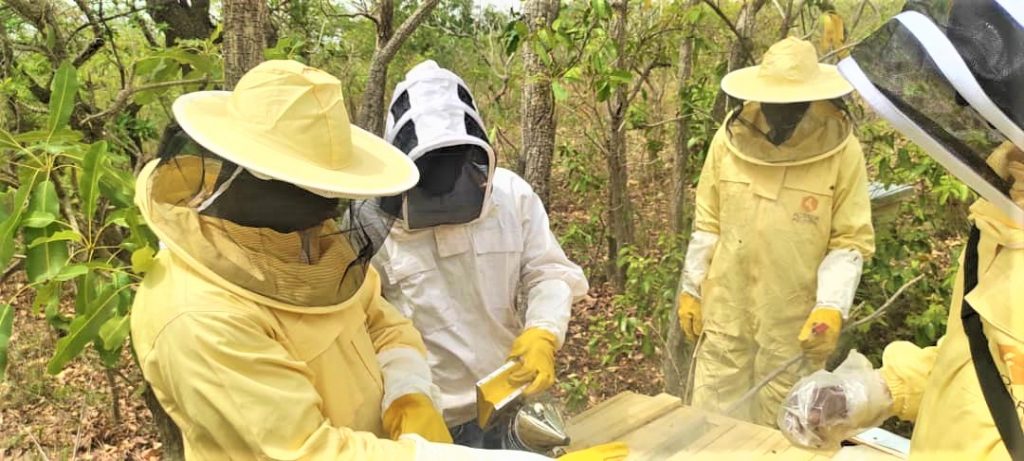In an effort to comprehensively communicate the successes of its collaboration with USAID under the West Africa Trade & Investment Hub (Trade Hub) initiative, Koster Keunen West Africa (KKWA) led a virtual grant closeout event on February 2, 2024. The event marked the successful conclusion of a three-year co-investment partnership that significantly contributed to the advancement of economic growth and sustainability within the beekeeping supply chain in West Africa. Among the attendees were key representatives of KKWA, USAID, and the Trade Hub, including the following: Sylvain Cattin, Managing Director (KKWA); Nasser Bembah, Sustainable and Organic Sector Manager (KKWA); Marc Amessi, Sustainable and Organic Sector Assistant (KKWA); Kafui Djonou, Senior Project Management Specialist (USAID/West Africa); Michael Andersson, USAID Foreign Service Officer, African Bureau (Washington D.C.); Evelyn Anfu, Project Management Specialist – Trade & Agriculture (USAID/West Africa); and with the Trade Hub: Robin Wheeler, Chief of Party; Aminata Mbaye, Deputy Chief of Party; and Etienne Chia-ah, Public-Private Partnership Lead.
With the beeswax ingredient market being worth more than $150 million annually, and the unmet demand for West African beeswax standing at over $10 million, KKWA was positioned to take part of the ideal market opportunity. In December 2019, the Trade Hub awarded a $1.78 million co-investment grant to KKWA to develop a sustainable beekeeping supply chain and professionalize beekeepers to increase the quantity and quality of beeswax, primarily to be exported internationally for use in cosmetics and other products. The project’s goals included introducing sustainable and organic beekeeping practices, along with acquiring new equipment and digitalizing supply chain operations, to secure, develop, and improve the supply chain. The traditional methods of beekeeping and collection of beeswax and honey led to low quality products that were laced with pesticides and other impurities and largely untraceable.
After three years of implementing its activities, KKWA exceeded five of its six project targets, while increasing its work to span eight countries (Mali, Sierra Leone, Togo, Benin, Ghana, Côte d’Ivoire, Nigeria, and Burkina Faso) by the project’s end.
KKWA’s project results against some of its targets include training 10,042 beekeepers in best practices (Target: 11,200); supplying 1,200 beekeepers with personal protective equipment (PPE), including suits, gloves, and smokers, and further professionalizing them to individually manage 30 hives (Target: 1,200); and surpassing the $5.6 million export target to reach $9.1 million, representing a 66.7 percent increase in KKWA’s export revenues. Of the exports catalyzed, $4 million worth were exported to the United States through AGOA. In terms of sub-regional trade, $6.2 million was realized from producers’ sales, a significant portion of which ($4.4 million) was in Burkina Faso and Mali. This is especially noteworthy in light of the impacts of violent extremism in these and other Sahelian countries.
The numbers only tell part of the success story: while KKWA was able to successfully meet its target to install 36,000 hives across eight countries, several partner aggregators being certified organic. Due to the increased confidence given to buyers due to the improved quality of products coupled with the new end-to-end traceability app developed through the USAID project, KKWA’s partner beekeepers have benefitted from an additional $1.20 per kg of beeswax sold. With the 30 percent increase in yield for farmers that benefit from the pollination provided by the beekeeping activities, $500 in additional annual income has been realized for farmers and forest-dependent people. Further, due to KKWA taking deliberate steps to integrate and empower women in an adult-male dominated sector, the participation of women grew three times, from 928 at the outset to 2,484.

KKWA’s professionalizing over 1,200 beekeepers in eight countries in West Africa includes equipping them with the required personal protective equipment (PPE) to perform their duties more effectively and safely.
KKWA’s presentation during the close-out event highlighted valuable lessons that greatly impacted their project’s success, including learning specific to their value chain—placing hives high up, for example on tree branches, helps to improve the colonization rate for wild bees—but also, learning that could be applied to agriculture projects in general. For example, providing best practice training during the harvest period is more effective and provides better outcome. Additionally, their experiences illustrated that localization and empowerment of local partners significantly improved decision making and sped up implementation.
Sylvain Cattin, KKWA’s Managing Director, stated that the technical support and guidance from the Trade Hub contributed to the successful implementation of the grant. “USAID/Trade Hub partnership was an accelerator to scale our social but profitable business model across West Africa to make KKWA self-reliant, meet customer needs through export, notably to the U.S., benefit farmers, and improve biodiversity,” Cattin shared.
KKWA’s plans post-Trade Hub include expanding into three new countries (Liberia, Guinea, and Senegal); installing an additional 50,000 hives; setting up a program focused on involving young girls in the beekeeping value chain; and developing an online training program. Continuing in the practices that contribute to preserving biodiversity, KKWA plans to plant another 100,000 trees in Togo, Benin, Ghana, Côte d’Ivoire, Nigeria, and Burkina Faso—in addition to the 10,000 planted in Burkina Faso and Togo during the project—increasing forage for bees. Nasser Bembah, KKWA’s Sustainable and Organic Sector Manager, emphasized the team’s eagerness to continue to collaborate and share successes with USAID.
The event illuminated the significant strides made by KKWA and the USAID Trade Hub in leveraging a market-based approach to drive economic growth, highlighting the potential of public-private partnerships in fostering sustainable transformation and a brighter future for citizens in the region.

